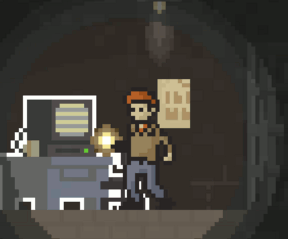![]() Link Dump Friday loves you soooooo much! How much, you ask? Well, since you can't see how wide my arms are flung, take a gander at the content below for just part of a measure of that affection instead! This week we've got not one but two interviews with the indomnitable Mike Morin of Alice is Dead notoriety, and Benjamin Rivers joins us to talk about his intriguing and eerie upcoming indie horror adventure, Home. (Maybe it'll save me from the upcoming crushing disappointment of Silent Hill: Downpour!) In addition, we've also got the usual roundup of previews and interesting news from around the internet! Sound good? Okey dokey lokey! Let's get started!
Link Dump Friday loves you soooooo much! How much, you ask? Well, since you can't see how wide my arms are flung, take a gander at the content below for just part of a measure of that affection instead! This week we've got not one but two interviews with the indomnitable Mike Morin of Alice is Dead notoriety, and Benjamin Rivers joins us to talk about his intriguing and eerie upcoming indie horror adventure, Home. (Maybe it'll save me from the upcoming crushing disappointment of Silent Hill: Downpour!) In addition, we've also got the usual roundup of previews and interesting news from around the internet! Sound good? Okey dokey lokey! Let's get started!
 That Metroidvania Melody Do you know Treasure Adventure Game? You should, because Robit Studios' indie metroidvania RPG adventure is not only really, really good, it's also really, really free! If you are familiar with the game and love it as much as we (and our community!) do, then you might want to check out the game's soundtrack, now available for purchase from Bandcamp for $6.00USD or more. Why? Well, aside from including eight bonus tracks, a PDF of art, and an interactive map, you also get that warm glow that comes with supporting a really deserving indie developer... and perhaps even providing a little funding towards any future projects Robit Studios might have in mind!
That Metroidvania Melody Do you know Treasure Adventure Game? You should, because Robit Studios' indie metroidvania RPG adventure is not only really, really good, it's also really, really free! If you are familiar with the game and love it as much as we (and our community!) do, then you might want to check out the game's soundtrack, now available for purchase from Bandcamp for $6.00USD or more. Why? Well, aside from including eight bonus tracks, a PDF of art, and an interactive map, you also get that warm glow that comes with supporting a really deserving indie developer... and perhaps even providing a little funding towards any future projects Robit Studios might have in mind!
 Kitty Can Code If you own an iOS and enjoy fun at all but haven't yet become acquainted with ambassadors of funk Rocketcat Games, well, I just don't know what to do with you! In addition to creating games like the wildly addictive Hook Worlds and the simply superb Mage Gauntlet, their logo is a kitten in a top hat with rockets! How rad is that? If you're a fan, you might want to spend some time lurking around their Facebook page, where they've been posting teaser images and info for their next project, an upcoming RPG! If it's by Rocketcat Games, you know it's going to be good, so keep your eyes peeled for more info and start practicing your money-handing-over-techniques!
Kitty Can Code If you own an iOS and enjoy fun at all but haven't yet become acquainted with ambassadors of funk Rocketcat Games, well, I just don't know what to do with you! In addition to creating games like the wildly addictive Hook Worlds and the simply superb Mage Gauntlet, their logo is a kitten in a top hat with rockets! How rad is that? If you're a fan, you might want to spend some time lurking around their Facebook page, where they've been posting teaser images and info for their next project, an upcoming RPG! If it's by Rocketcat Games, you know it's going to be good, so keep your eyes peeled for more info and start practicing your money-handing-over-techniques!

From the very beginning, Home, the upcoming indie horror adventure by Benjamin Rivers, looked interesting. Touted as "an intimate, story-based adventure with a tale that you determine", it looked like the perfect creepy, unsettling antidote to games that aim to startle more than scare. We were lucky enough to be able to get some more information from Benjamin for this interview to whet your appetite. Be sure to check out the official website for more information, a trailer, and ways to contact the man himself
Tell us a little about Home, and what sets it apart from all the other horror adventure games. How long can we expect a typical playthrough to last, roughly, and are you planning on charging money for it? I'm billing Home as a "subjective horror mystery"--the idea is that this isn't an action game, or a survival game, or an inventory management game. It was conceived as an interactive story that you affect through your actions. There is no combat and no fail state--but there is oozing atmosphere, an unsettling theme, and--hopefully--a story that, through your manipulation, means a lot to you as a player. Most players will get through the game in about an hour.
Ideally I'd like to have it as a small, paid download--two bucks or less. It's a risky concept, and one that's pretty niche, so I'm gauging interest. In the end, I really just want people to give it a shot and enjoy it. Right now it's planned as a PC release, but I really want to bring it to the Mac and to mobile platforms as well, if I can (psst; interested programmers should drop me a line).
 It looks like a lot of what happens within the game and the story depends on the choices we make within it. Can you give us an example of how this works beyond the usual kick puppy/don't kick puppy moral choices we typically see in games? How will this impact the replay value of the game?
Home is, at its core, an experiment in ambient, invisible storytelling. Depending on choices you make--not necessarily big, obvious choices--the game realigns itself a bit to keep the plot running so it makes sense to you. For example, did you pick up that dirty knife you found? If you did, the game knows it, and may present you with a different opinion of later events because of it. It doesn't mean you'll have a knife to fight a boss with; it means that now when your character narrates what's happening, he's going to be thinking about that knife. Did you notice that photo, and maybe that other piece of paper over there? Whether you did or not will mean that you, and the character himself, will make certain assumptions and come to certain conclusions as you progress. Rather than reward or punish players with gameplay tropes for binary actions, the game is like telling a story around a campfire; if certain aspects of the story or environment seem to interest the player more, than the game is going to play along. Ultimately, what really happens is a conversation the player has with the game.
It looks like a lot of what happens within the game and the story depends on the choices we make within it. Can you give us an example of how this works beyond the usual kick puppy/don't kick puppy moral choices we typically see in games? How will this impact the replay value of the game?
Home is, at its core, an experiment in ambient, invisible storytelling. Depending on choices you make--not necessarily big, obvious choices--the game realigns itself a bit to keep the plot running so it makes sense to you. For example, did you pick up that dirty knife you found? If you did, the game knows it, and may present you with a different opinion of later events because of it. It doesn't mean you'll have a knife to fight a boss with; it means that now when your character narrates what's happening, he's going to be thinking about that knife. Did you notice that photo, and maybe that other piece of paper over there? Whether you did or not will mean that you, and the character himself, will make certain assumptions and come to certain conclusions as you progress. Rather than reward or punish players with gameplay tropes for binary actions, the game is like telling a story around a campfire; if certain aspects of the story or environment seem to interest the player more, than the game is going to play along. Ultimately, what really happens is a conversation the player has with the game.
 Talk to us about the actual gameplay, how we explore and progress. Will we be solving any puzzles in typical find item --> use item adventure game fashion, or does Home handle differently?
Mechanically speaking, the game is as simple as possible (and was designed as such); the player explores a 2D, side-scrolling environment and interacts with objects via a single key press; it's all done through the keyboard, so it's really accessible. Home uses a first-person narration, so interacting with an item brings up a silent-movie style title card where players get to read dialogue, and sometimes make choices. There are things to find and take (or not), light puzzles to solve, though there's no inventory. The game pays attention, so if you have an item and approach a situation, it will know and give you a different option than if you didn't. There are locked doors, sure, and some moments of that nature, but the game is less about stopping you from progressing, and more about paying attention to what caught your eye along the way.
Talk to us about the actual gameplay, how we explore and progress. Will we be solving any puzzles in typical find item --> use item adventure game fashion, or does Home handle differently?
Mechanically speaking, the game is as simple as possible (and was designed as such); the player explores a 2D, side-scrolling environment and interacts with objects via a single key press; it's all done through the keyboard, so it's really accessible. Home uses a first-person narration, so interacting with an item brings up a silent-movie style title card where players get to read dialogue, and sometimes make choices. There are things to find and take (or not), light puzzles to solve, though there's no inventory. The game pays attention, so if you have an item and approach a situation, it will know and give you a different option than if you didn't. There are locked doors, sure, and some moments of that nature, but the game is less about stopping you from progressing, and more about paying attention to what caught your eye along the way.
Home isn't your first foray into game design, with other indie download titles under your belt, but it looks decidedly different than your previous work not only in theme, but style as well. What made you decide you wanted to make a horror game? Is there any media (movie, game, book) you felt influenced it? Home began as a short story I wrote many years ago about a man who's locked in a small room. It was meant to be a survival kind of story, but I only wrote the opening. In 2010 I found that bit of text, and challenged myself to write a game around the concept. My wife was trying to convince me to do a murder mystery, or something really spooky, so I decided to give it a shot.
 There are a lot of horror games out there already, ranging from action titles like Resident Evil to slower, more thoughtful games like the Chzo Mythos. What does "horror" mean to you, and how are you planning to get under our skin with Home? What sort of content can we expect to encounter if we play... heavy on the gore, or more subtle, disturbing encounters?
I have always loved deeply disturbing, psychological horror stories, but most of what is labeled "horror" in games these days is more action-oriented, or really just spooky fantasy, or a haunted-house kind of experience, and doesn't try to engage the player on that unique mental level. Horror is about showing you a mirror and reflecting something truly terrifying; the key is that if you can't relate--if you can't see some version of yourself in that mirror--then you never get that deep experience. With Home, there isn't much gore, and no monsters will pop out of closets--instead, the major delivery for the experience is the narration itself, and (I can't stress this enough) player investment. if you want to soak up that atmosphere, and if you're willing to go along for the ride, then I'm going to give you lots of opportunities to think, to stew--to wonder what's in that mirror. And in the end, what you get out will be what you take in with you.
There are a lot of horror games out there already, ranging from action titles like Resident Evil to slower, more thoughtful games like the Chzo Mythos. What does "horror" mean to you, and how are you planning to get under our skin with Home? What sort of content can we expect to encounter if we play... heavy on the gore, or more subtle, disturbing encounters?
I have always loved deeply disturbing, psychological horror stories, but most of what is labeled "horror" in games these days is more action-oriented, or really just spooky fantasy, or a haunted-house kind of experience, and doesn't try to engage the player on that unique mental level. Horror is about showing you a mirror and reflecting something truly terrifying; the key is that if you can't relate--if you can't see some version of yourself in that mirror--then you never get that deep experience. With Home, there isn't much gore, and no monsters will pop out of closets--instead, the major delivery for the experience is the narration itself, and (I can't stress this enough) player investment. if you want to soak up that atmosphere, and if you're willing to go along for the ride, then I'm going to give you lots of opportunities to think, to stew--to wonder what's in that mirror. And in the end, what you get out will be what you take in with you.
Interview! Continue reading for an interview with Mike Morin!

While he's done a lot of work, developer Mike Morin (ImpendingRiot) catapulted himself into adventure gaming stardom with his twisted spin on a classic fairytale. With an eye for storytelling and a willingness to take risks, Mike has become known for his unique and striking work. With the release of the first chapter in a promising new series, now seemed like the perfect time to find out a little more about how he works and what he has in store for us...
Warning! The following text contains plot details concerning both the Alice is Dead series and Myosotis.
While you're probably most known in our community for your work on the popular Alice is Dead series, you've actually done a lot of different projects in the past. How would you say you've changed over the years and grown both as a designer and a developer? What do you think is the most important thing you've learned from everything you've tried? That's a great question, and it's something I've asked myself many times. I've had numerous interests, and truthfully I've always been a little afraid that I had too many. I've dabbled with digital painting, animation, games, writing, card magic (I'm serious). I didn't want to be a jack of all trades and master of none. I wanted to pinpoint what it was that I was good at. Or rather, what it was I could realistically pursue to become good at. It recently dawned on me that the common thread with a majority of my interests (such as animation, comics, art, games) was storytelling. I enjoy telling stories. That's what has probably shaped my design decisions the most. When I go in to something, I first ask myself is there a story here? Can I move somebody? Or at the very least, make them interested. If I can, to me that's a personal success.
As far as the development process, I think everyone instinctively knows that having a good team is important but I can't overstate that enough. Everyone involved with Alice is Dead was absolutely phenomenal to work with. I really make an effort to treat people I work with as friends rather than just casual business acquaintances. If you poke around Flash game development sites, you sometimes spot a mercenary approach to game development. People will hire out their services to whoever wants them. There's absolutely nothing wrong with that. But I've been fortunate enough to work with people that I'm also a fan of. Hyptosis was and still is an incredible mentor to me as far as art. Josh Tomar voice acted in my very first animations. I was a fan of Hania from the first time I heard her music. None of these people expected much, if anything, in return. They offered their services because they were passionate about what they do. And to a certain degree, the believed in me and trusted me. There's something profoundly humbling about that. The simplest advice I could offer for game development is find people you love to work with, and keep working with them.
 Alice is Dead was a huge success with not only our staff, but our community is well. What was creating that like, and how do you feel its success and the feedback it garnered impacted you as a developer? Is there anything you wish you'd done differently or are particularly proud of?
Alice is Dead has been one of the most surreal experiences imaginable. I know it's probably incredibly cliché to say, but I never imagined in a million years that it would be as popular as it is. It was really created as a practice game. I wanted to get better at programming, and Hyptosis wanted to make a jump from Webcomics to Flash games. We both have uncannily similar interests in film, art, etc, so we knew early on we wanted to do something a bit dark. At the time, my only real frame of reference for a Flash game's success was how it did on Newgrounds. Daily Feature was like the holy grail to me. Top 50 was unimaginable. So when we started planning Alice is Dead, I really was trying to analyze what I had seen on NG and how it had performed. I noticed that the point-and-click genre rarely had a narrative. Or when it did, it was fairly brief. I'm not discrediting those games at all, but when we looked at those games we thought, "Okay, this is definitely an area where we can do something different." So we did. The decision to do a retelling of a fairytale/public domain thing was to accommodate the smaller scope of Flash games. If we wanted to have an ambitious narrative, we'd need to cheat a bit. By using characters and places that people are already instinctively a little familiar with, you don't have to establish as much. They kind of know what is going on. Also, any time you establish expectations and then defy them, I think you can't help but thrill the player a little. That's where the title came from. It's a game clearly about Wonderland...but Alice is dead.
Alice is Dead was a huge success with not only our staff, but our community is well. What was creating that like, and how do you feel its success and the feedback it garnered impacted you as a developer? Is there anything you wish you'd done differently or are particularly proud of?
Alice is Dead has been one of the most surreal experiences imaginable. I know it's probably incredibly cliché to say, but I never imagined in a million years that it would be as popular as it is. It was really created as a practice game. I wanted to get better at programming, and Hyptosis wanted to make a jump from Webcomics to Flash games. We both have uncannily similar interests in film, art, etc, so we knew early on we wanted to do something a bit dark. At the time, my only real frame of reference for a Flash game's success was how it did on Newgrounds. Daily Feature was like the holy grail to me. Top 50 was unimaginable. So when we started planning Alice is Dead, I really was trying to analyze what I had seen on NG and how it had performed. I noticed that the point-and-click genre rarely had a narrative. Or when it did, it was fairly brief. I'm not discrediting those games at all, but when we looked at those games we thought, "Okay, this is definitely an area where we can do something different." So we did. The decision to do a retelling of a fairytale/public domain thing was to accommodate the smaller scope of Flash games. If we wanted to have an ambitious narrative, we'd need to cheat a bit. By using characters and places that people are already instinctively a little familiar with, you don't have to establish as much. They kind of know what is going on. Also, any time you establish expectations and then defy them, I think you can't help but thrill the player a little. That's where the title came from. It's a game clearly about Wonderland...but Alice is dead.
As far as if I'd do anything differently, I have to be careful about how I answer that. Point blank, Alice is Dead 3 is probably the least favorite to many people. I'll fully admit it has its flaws. But quite a bit of positive still came from it, and at the end of the day I'm still proud of it. I'm almost glad it got a bit of backlash. I think it would have been dangerous if we got too comfortable with what we were doing. I think there was a leap in ambition from 1 to 2, and from 2 to 3. Did I stumble with 3? Of course. But I'll always prefer aiming too high to aiming too low. Plus you learn hell of a lot more from your failures than your successes. I appreciate the articulated criticism that I received from your review as well as several others. But some of the reviews were very hostile and attacked me on a personal level, which is always a little hard to handle. The series is rather big and popular, but all of us behind it are still just regular people that at the end of the day care about our work. Looking at it positively, it just meant I made something people were very passionate about. I do sometimes worry that a Kathy Bates type will cripple my legs and demand I write Alice is Dead 4 and bring Misery back to life. Excuse me, bring Rabbit back to life.
I'm incredibly proud to have a fan base. I feel bad that I don't respond to every review or message, but I sincerely appreciate all of them. But what really makes me happy is all of the theories that people have as far as the story. There were a few people that did piece together everything in the game. Even if they were a little off, it was very rewarding to see the theories because you knew that those people were really into it. They were using their imaginations and they were engaged with your work on a whole other level. It is quite flattering.
You seem to put a big emphasis on not only story, but atmosphere as well in your adventure games. Which do you feel is most important to get "just right", and which gives you the most trouble when you're preparing a project? Atmosphere tends to come naturally honestly. It's not something that I'm super conscious about, at least early on. I think the trick is to just be fearless. When you start trying to make something for everyone, you start making something bland. I think it's best to just do what feels right at first. THEN look at it, and ask yourself why does this work or why doesn't this work? If you start off planning too much, you lose a certain spontaneity. The atmosphere with Alice is Dead was shaped obviously by Hyptosis' art. I can't speak highly enough about it. It was gritty and whimsical all at once. And it was definitely different compared to art found in most Flash games. Beyond the art, I think the key to creating a unique atmosphere or tone is to defy expectations. The decision to use upbeat music was a very conscious one. I wanted to avoid the trope of using intentionally scary horror music. Stuff like the Halloween theme, the Jaws theme, organ music, you know...stuff that is made with the intention of sounding scary. I felt like audiences were used to that. You hear that music and you know right away what its intentions are. It is trying to scare you. When you hear upbeat 1900s music in a cave filled with puzzles and a corpse, suddenly the brain has a little bit more trouble figuring out what's going on. You wake it up.
Story is always a bit tricky, especially when you're working in a short medium like a flash game. You have to make the most of your "time". You don't want to bog down the players with exposition and overwhelm them with information. So when I do tell them things, I try to make it interesting and optional. I also think that when you raise new questions, you have a responsibility to answer at least one or two old questions. I do love questions though. I can totally understand why some people were frustrated by how implicit the story of Alice is Dead was. But my personal belief is that putting things together yourself is always preferable to having them fed to you. So I try to approach story with that philosophy. Sometimes the exacts aren't important. Sometimes all that is important is that you convey a certain emotion or tone to the player. People did suspect that we made everything up with Alice as we went, but that wasn't true. Pretty much every major event was planned out. We did do a lot of improvisation on the micro level, but we had a good idea where we wanted to go with the story from the very start. Rabbit was always going to die. He was arguably the most immoral character of the whole lot. He wasn't nice, he was an assassin. We felt he needed to get his comeuppances.
As far as which one is more important? Within the context of my games, probably the atmosphere. I know some players don't pay a slightest bit of attention to the smaller details of the story, but if the atmosphere is off or irritating, you lose them instantly. The atmosphere is in-your-face but you have the option of finding the whole story.
 Your latest game, the first chapter of Myosotis, is significantly different from your previous work, and really only appears to share (so far) your penchant for
Your latest game, the first chapter of Myosotis, is significantly different from your previous work, and really only appears to share (so far) your penchant for
mysterious narratives. How did you come up with the concept, and do you have the whole story plotted out?
I knew for awhile that I wanted to make a Noir game. It's one of my favorite genres of film. I have memories of being a kid and watching Alfred Hitchcock Presents. I'm sure I had no clue what was going on, but I remember being captivated by the black and white aesthetic and the interplay of shadow and light. A few years later I've realized the stories ain't that bad either. Anyways, the game was actually suppose to be made after Alice is Dead 2. I had pages and pages of level designs and ideas. The story was completely different back then. It was about a detective trying to find a missing woman at a carnival. It was actually a really straightforward and traditional mystery. No supernatural elements or anything. But like most decent ideas, you find out it has already been done. There was at least one detective game involving a carnival.
There is still a bit of that original idea left in the game though. This is a really morbid tidbit so I apologize. In the original story I had for the game, the missing woman was killed and dismembered by a psychotic clown. In order to dispose of the body, he put the pieces into garbage bags and then tethered them to balloons. At the start of that version of the game, I was still going to have a balloon floating up into the sky. But in that case, it would serve as ominous foreshadowing. You'd have a sick feeling in your stomach for sure when you found out where it came from. So even though the balloon in the game now is more of a representation of a fleeting love, it definitely had really dark origins.
The actual idea of what the game is now came from a personal experience. Yes, even indie game developers find love and lose love. Don't worry though, it's not nearly as dramatic as the story in the game. But I really was coping with strong emotions. The game provided a rather cathartic outlet for these feelings. However I did suspect that a simple "I can't find my long lost love" story wouldn't be enough for most people so I started thinking of a way to make it stand out. I had this weird concept of decay and malfunction in my mind. A lot of the rooms reflected that, that sort of run down look. But it got really interesting when I tried bringing that sense of decay to the story itself. It starts as a run of the mill 1950s detective story right down to the private-eye style monologue. But at a certain point in the game the story breaks down and becomes something entirely different. It starts veering away from the genres conventions and traditions.
The story is plotted out in the sense that I know exactly why Rick was brought to that hotel. I know exactly what they want with him, what that box is, what the Nova digits are. I know all of that. What I haven't settled on is how I want to continue explaining this stuff. In terms of perspective. Without giving away too much, when you mess with time and you have more than one of the same protagonist you can start to do interesting things with point of view. I could have Chapter 2 be from the point of view of Lily, I could have it be from the "other" Rick. There's a lot of options on the table.
There are a lot of people out there who want to make games, but haven't, either because they get discouraged, are too intimidated by the process, pick too ambitious a project, or for any other reason. What's the best advice you could give to someone who wants to create games... or to yourself if you could go back to the start of your time as a developer? Again, I apologize because this is going to start off like a bad motivational poster, but it's true. Believe in yourself. I'm lucky because I've always been surrounded by supportive people. But still, whenever you do anything, the loudest voice cheering you on has to be your own. You are going to stumble, you are going to get bad reviews, you're going to make something bad, you're going to think whatever it is you're trying to do is too hard, and guess what? There may not be anyone telling you to keep going. You have to be that person. You have to be that person every time.
The hard thing to address is the problem of being too ambitious. There's kind of a paradox aspect to that. A good analogy I can make is related to screenwriting, which I've been interested in for a few years now. They say that most likely the first script you write will be bad and nothing will come of it. That's just the facts and the odds. So how the hell do you motivate yourself to write that first FADE IN? You kind of have to trick yourself into believing that it MIGHT work. That your first thing might be great and sell and that you'll defy the odds. You probably won't. But you definitely won't if you never try. What's more important than that first screenplay or that first flash game is the second one. The third one. Just get your hands dirty and try.
It should also be said that you shouldn't worry too much about what others want to play. Make a game you'd want to play. There are other people like you. You can always tell the difference between a game that someone made purely to be commercial and a game that someone made with a bit of passion. Always. I have more respect for the developer that tried something wildly different and failed spectacularly than a developer who played it safe and produces the same thing we've already seen a hundred times. The irony is, I think most people think it's a safety net if they make a game that's like the ones already out there. How can it go wrong? And that might be true, it probably wont go wrong. But the question then becomes how will it be seen? How will it stand out?





Update